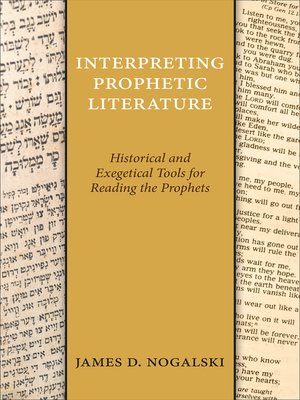Interpreting Prophetic Literature
ebook ∣ Historical and Exegetical Tools for Reading the Prophets
By James D. Nogalski

Sign up to save your library
With an OverDrive account, you can save your favorite libraries for at-a-glance information about availability. Find out more about OverDrive accounts.
Find this title in Libby, the library reading app by OverDrive.



Search for a digital library with this title
Title found at these libraries:
| Library Name | Distance |
|---|---|
| Loading... |
Exegeting a textburrowing deep into its history, language, and literary structureis an indispensable skill for any serious student of the Bible. Given their theological richness and poetic power, the prophetic texts of the Hebrew Bible would seem to be prime candidates for exegetical examination, but they often pose difficulty. In this book, James Nogalski offers solid, practical guidance on how to read and exegete a prophetic text in its literary, historical, and conceptual contexts. Assuming no prior knowledge of Hebrew, Nogalski devises an exegetical method that focuses on the distinctive elements of prophetic literature, rather than on the narrative material one finds in practically all introductions to exegesis. He provides clear examples for understanding poetic texts, prophetic genres, changing voices, and other important aspects of these texts. This book offers essential tools to help readers navigate the particular challenges and opportunities of interpreting the prophets.
|Exegeting a textburrowing deep into its history, language, and literary structureis an indispensable skill for any serious student of the Bible. Given their theological richness and poetic power, the prophetic texts of the Hebrew Bible would seem to be prime candidates for exegetical examination, but they often pose difficulty. In this book, James Nogalski offers solid, practical guidance on how to read and exegete a prophetic text in its literary, historical, and conceptual contexts. Assuming no prior knowledge of Hebrew, Nogalski devises an exegetical method that focuses on the distinctive elements of prophetic literature, rather than on the narrative material one finds in practically all introductions to exegesis. He provides clear examples for understanding poetic texts, prophetic genres, changing voices, and other important aspects of these texts. This book offers essential tools to help readers navigate the particular challenges and opportunities of interpreting the prophets.







